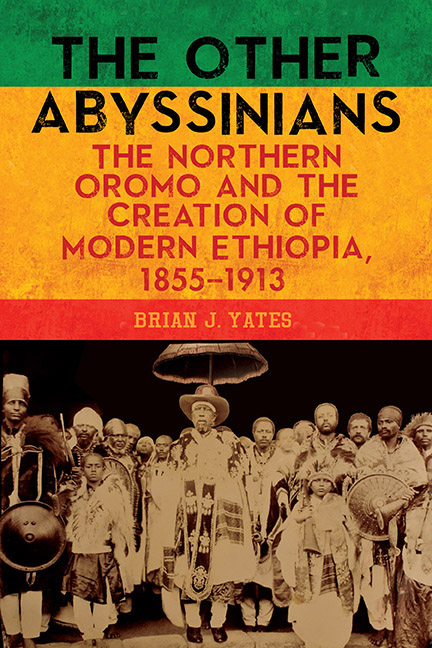Book contents
- Frontmatter
- Contents
- Preface
- Introduction: What about the Oromo Habäsha? Liberating Northern Oromo Experience from Competing Nationalisms
- 1 Cultural Backgrounds and the Habäsha State
- 2 In but not of: The (Re)Integration of the Wällo Oromo into the Habäsha Community
- 3 Menilek, Gobäna, and the Creation of Habäsha Shäwa, 1855–88
- 4 Recreating the Autonomy of Wällo: The Unions of Mikaél and Menilek
- 5 From Personal Relationships to a Centralizing State: Shäwan Ethiopia (1889–1913)
- Conclusion: The Oromo Habäsha in Modern Ethiopia
- Appendix A Guide to the Transliteration of the Ethiopic Script to the Latin Script
- Appendix B Glossary of Ethiopian Terms
- Appendix C Sample Interview Questions for Shäwa and Wällo
- Notes
- Bibliography
- Index
5 - From Personal Relationships to a Centralizing State: Shäwan Ethiopia (1889–1913)
Published online by Cambridge University Press: 21 March 2020
- Frontmatter
- Contents
- Preface
- Introduction: What about the Oromo Habäsha? Liberating Northern Oromo Experience from Competing Nationalisms
- 1 Cultural Backgrounds and the Habäsha State
- 2 In but not of: The (Re)Integration of the Wällo Oromo into the Habäsha Community
- 3 Menilek, Gobäna, and the Creation of Habäsha Shäwa, 1855–88
- 4 Recreating the Autonomy of Wällo: The Unions of Mikaél and Menilek
- 5 From Personal Relationships to a Centralizing State: Shäwan Ethiopia (1889–1913)
- Conclusion: The Oromo Habäsha in Modern Ethiopia
- Appendix A Guide to the Transliteration of the Ethiopic Script to the Latin Script
- Appendix B Glossary of Ethiopian Terms
- Appendix C Sample Interview Questions for Shäwa and Wällo
- Notes
- Bibliography
- Index
Summary
Häbtä Giyorgis’ rise to become one of the most powerful men in twentiethcentury Ethiopia was an improbable one. He was not born into a Habäsha noble family; in fact, he first came into contact with the Habäsha state when his village was conquered during one of Ras Gobäna's campaigns. After he was taken prisoner, he was castrated and became a camp follower. Through sheer force of merit and will, Häbtä Giyorgis rose through the military ranks and, like many at Adwa, proved his worth in that Ethiopian victory. His lack of local legitimacy, his inability to produce heirs, and his humble birth were no match for his military genius or, during the institutionalizing of Menilek's state, for his political and administrative acumen as the head of Menilek's council of ministers. After Menilek's death, Häbtä Giyorgis both supported Menilek's successor, Iyasu, and engineered the coup that put Ras Täfari and Empress Zäwditu on the throne in 1916. The strongest evidence of the end of local authority in Ethiopia is that Häbtä Giyorgis, a person born with no connection to the imperial center, became a tremendously powerful man in post-Menilek Ethiopia. His life story speaks to the rewards of becoming a Habäsha in Ethiopia: in one lifetime, he went from a community outsider to becoming one of the most powerful members of the Habäsha community. This change was a culmination of his experiences at Adwa, as Hailu writes,
…the victory at Adowa created a sense of belonging to a much wider, more complex and intricate community. Other speech communities that used to be perceived as alien were gradually seen as being linked to one's own group by profoundly similar traits that transcended geographic and lingua-cultural barriers. Localism slowly began giving way to Ethiopianism. The monarchy, in the person of the sovereign, became the symbol of this unity and its concrete manifestation.”
Governing a significant part of the newly conquered southern territories cemented this change in identity, as As’mé writes: “The war with the Galla was completed by Nägus Menilek four hundred years after Ade [As’é] Galawdewos commenced it. All the Galla became tributary to Ade [As’é] Menilek … In the same year he appointed his kinsmen and the Amaroč over the Galla; and he billeted his soldiers on the Galla. He divided the land of the Galla by Qalad among the Amara.”
- Type
- Chapter
- Information
- The Other AbyssiniansThe Northern Oromo and the Creation of Modern Ethiopia, 1855-1913, pp. 105 - 132Publisher: Boydell & BrewerPrint publication year: 2020



